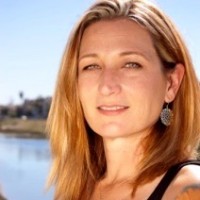“Forgiveness is not always easy. At times it feels more painful than the wound we suffered, to forgive the one that inflicted it. And yet, there is no peace without forgiveness.” ~ Marianne Williamson
Why do I find true forgiveness so hard?
I’m talking about forgiving actions that have deeply affected me as a person, forgiving the dark insidious mark left behind as if carved into stone, changing my shape forever. Forgiveness for the apology never received, never to be received, and the boiling hot anger it produces.
That anger eats me alive. It makes me bitter, resentful and cynical. It steals my joy, hope and peace. At first the anger fuels me, protects me, guards me against any further damage like a wolf mother defending her pups. But that wolf can turn on me. Fed a constant diet of anger and resentment, the wolf grows strong, drowning out my gentle spirit. Forgiveness is the only thing that can sooth it before the best parts of me are eaten away.
The idea of forgiving those who’ve wronged me in my life is like sandpaper on my skin. I’d rather direct my anger outward with a solid middle finger than inward with self-awareness. But that’s precisely what I need to do. Why? Because I find myself repeatedly being hurt in the same ways—and hurting others in the same ways, too.
Now, for the first time in my life, I’m contemplating not only the idea that I may have something to do with this, but that I can change it, too.
The phrase “forgive and forget” is one I know all too well. The problem is, I’m better at forgetting, not forgiving. It’s easy to put something behind myself, forget about it and carry on, hoping for different results this time. I pretend this is forgiveness, but it’s really just an easy way out—one where I don’t have to put any effort into the cause. I don’t learn anything through this process and inevitably find myself stuck in the same place again and again. Forgetting is as much about excusing others’ mistakes as it is about not acknowledging my own.
It’s much easier to point the finger at someone else—screaming out the wrongs they’ve committed and mistakes they’ve made, demonizing and condemning them. I just play my part as the victim, trapped by the need to blame others as the source of my pain and disappointment rather than examine my own actions and how they contributed or even caused the hurt.
And when I’m confronted with my own responsibility for these actions and the patterns of my own issues? I run away. I make excuses. I twist the facts into something that suits my needs. I hurt others when I do this and then I beat myself up some more.
I can’t forgive others if I can’t forgive myself first. So how do I actually forgive? The Catholic tinge to my upbringing tells me I should simply ask for it—a few Hail Mary’s around the rosary and I’m good to go. But this feels cheap and easy to me, like a quick fix rather than true self-awareness.
While I struggle with religious dogma, I’ve come to accept that I do have faith. I have faith in myself. My intuition whispers to me if I listen close enough. I usually just tell that bitch to shut up, but if I listen, she often has profoundly insightful things to say.
So what’s that voice telling me now?
That life is a learning process.
Perhaps we’re all given lessons in life that will help us grow. Is this a higher power at play or the situations we create? It’s hard to say. Many spiritual systems say our souls are reincarnated myriad times to learn particular lessons in the physical world, which is where our souls choose to live in order to learn those lessons and develop our consciousness into the spiritual one.
So I sat down and looked inward with honesty. I sought to find why my reactions and motivations were often coming from a place of pain rather than peace.
These behaviors exist for many reasons, none of which are relevant to my life today. At this point in my life, there’s no point in blaming anyone but myself for continuing to hold on to old ways that haven’t served me well, no matter how I learned those behaviors, or why at some point they were necessary. But I have learned and for this, I am grateful.
Reframing my life and struggles into lessons has allowed me to not just identify behaviors and emotional states I want to change, it has allowed me to forgive myself for them, too. It allows me turn the pain into something positive, something to be proud of: an achievement. I realize that the only forgiveness I need needs to come from within by seeking out my own truths and adjusting how I live and react to the world around me.
I’ve come to appreciate the opportunities I’ve been given in learning these lessons, and I now appreciate the role other people have played in teaching me these lessons. In turn, I’m able to forgive them and understand that they too are living their own obstacle course of life, which I am part of.
As far as forgive and forget goes? I choose not to forget. If I forget, what was the point? Forgetting means I haven’t learned anything. But I think I have learned to forgive, and by doing so, I can let it go and smile knowing my wolf, for now, is content.
~
Author: Jenny Dowdy
Editor: Evan Yerburgh
Image: Flickr
~
Facebook is in talks with major corporate media about pulling their content into FB, leaving other sites to wither or pay up if we want to connect with you, our readers. Want to stay connected before the curtain drops? Sign up for our curated, quality newsletters below.







Read 0 comments and reply